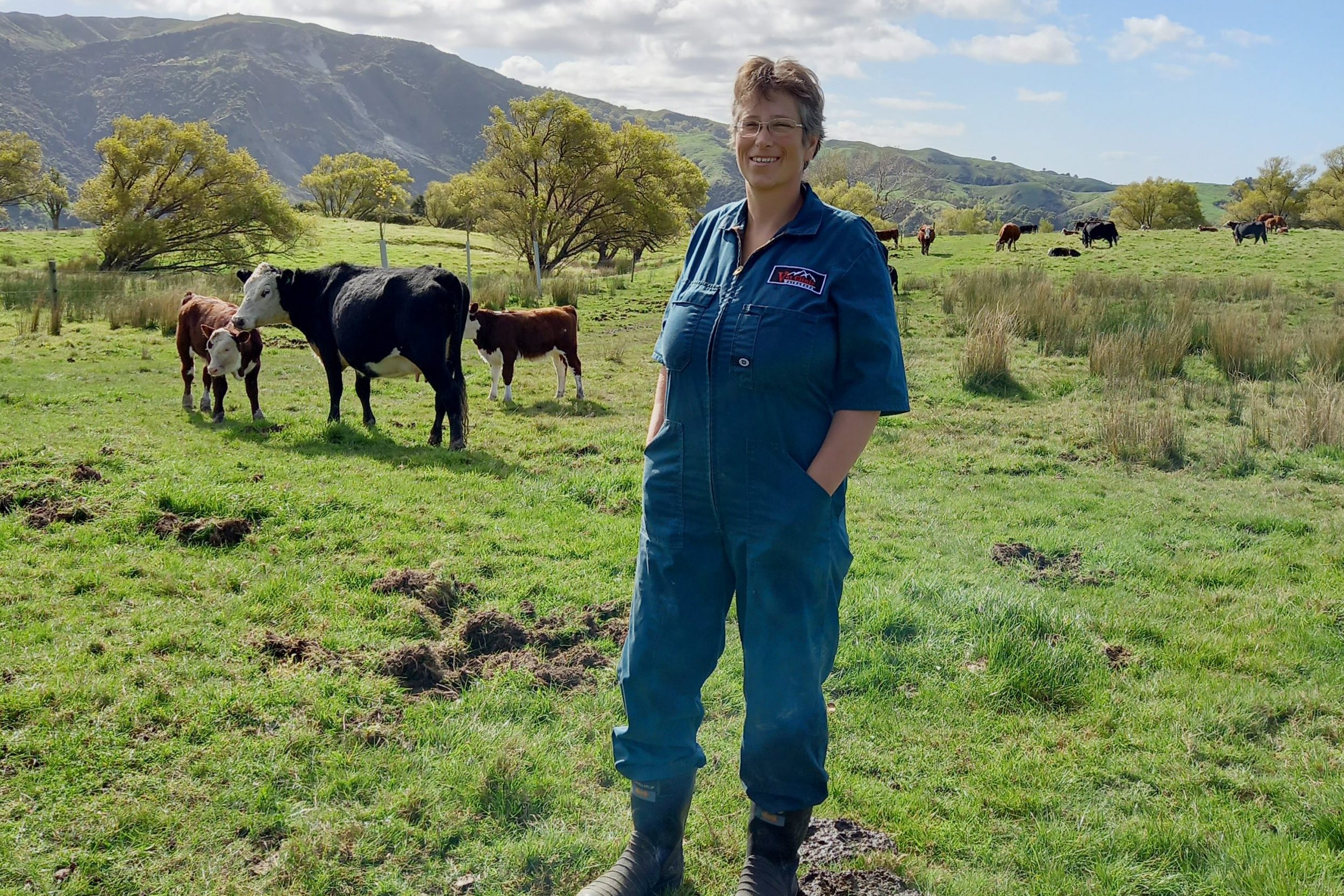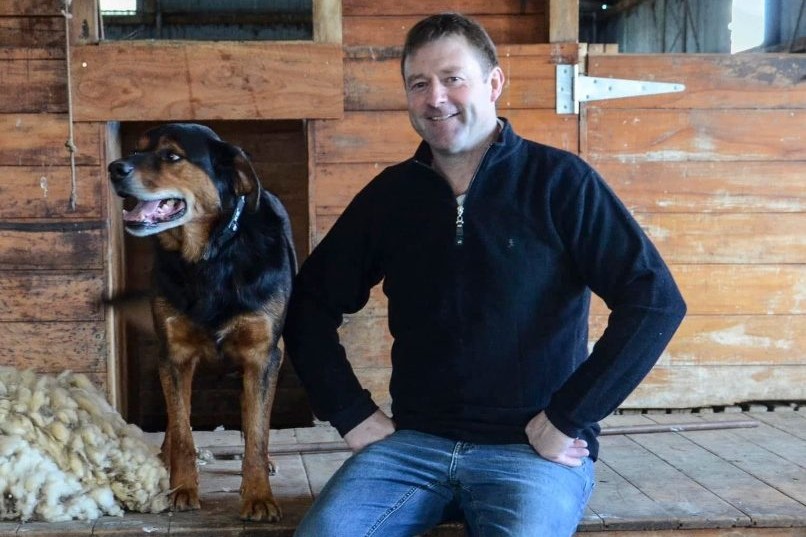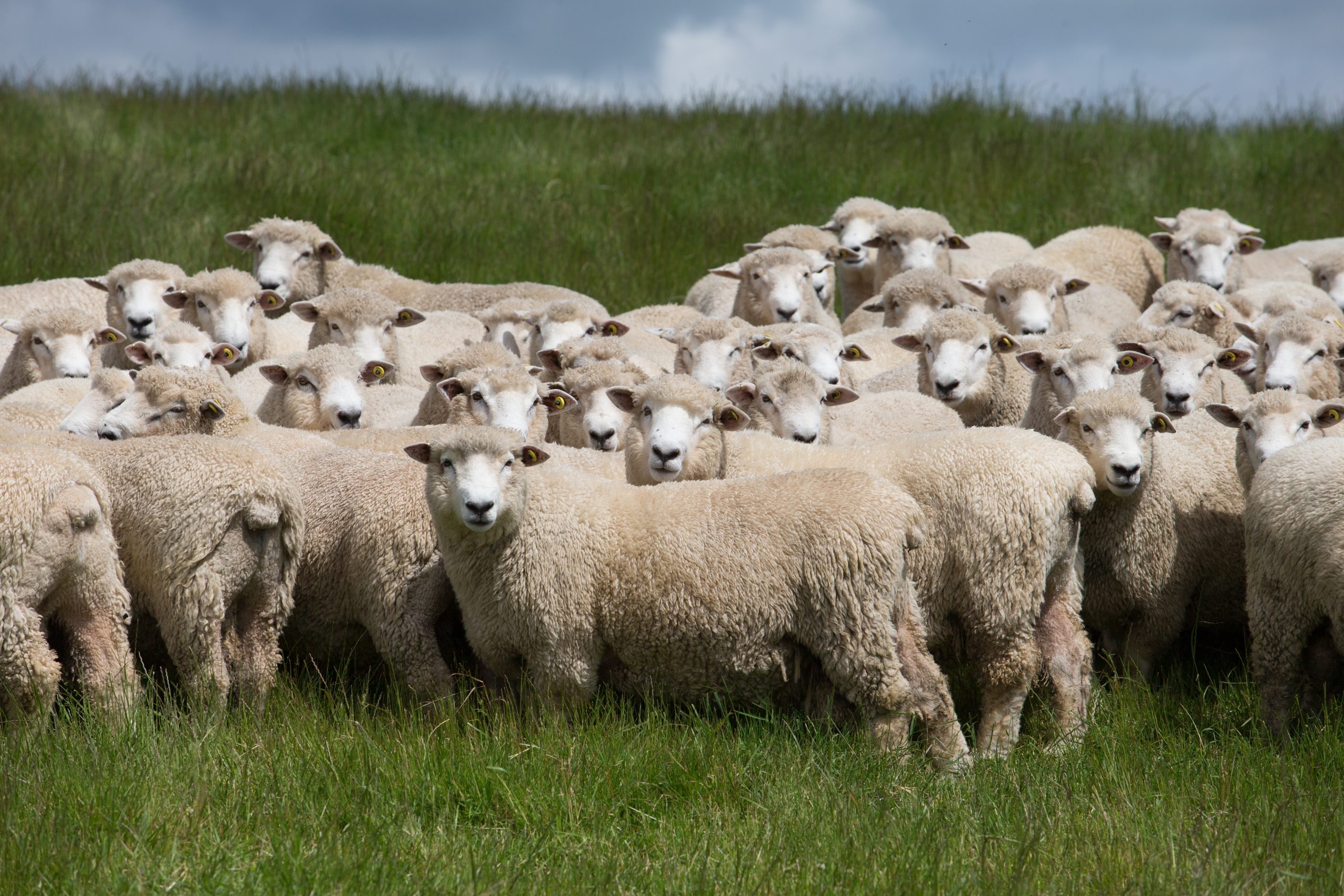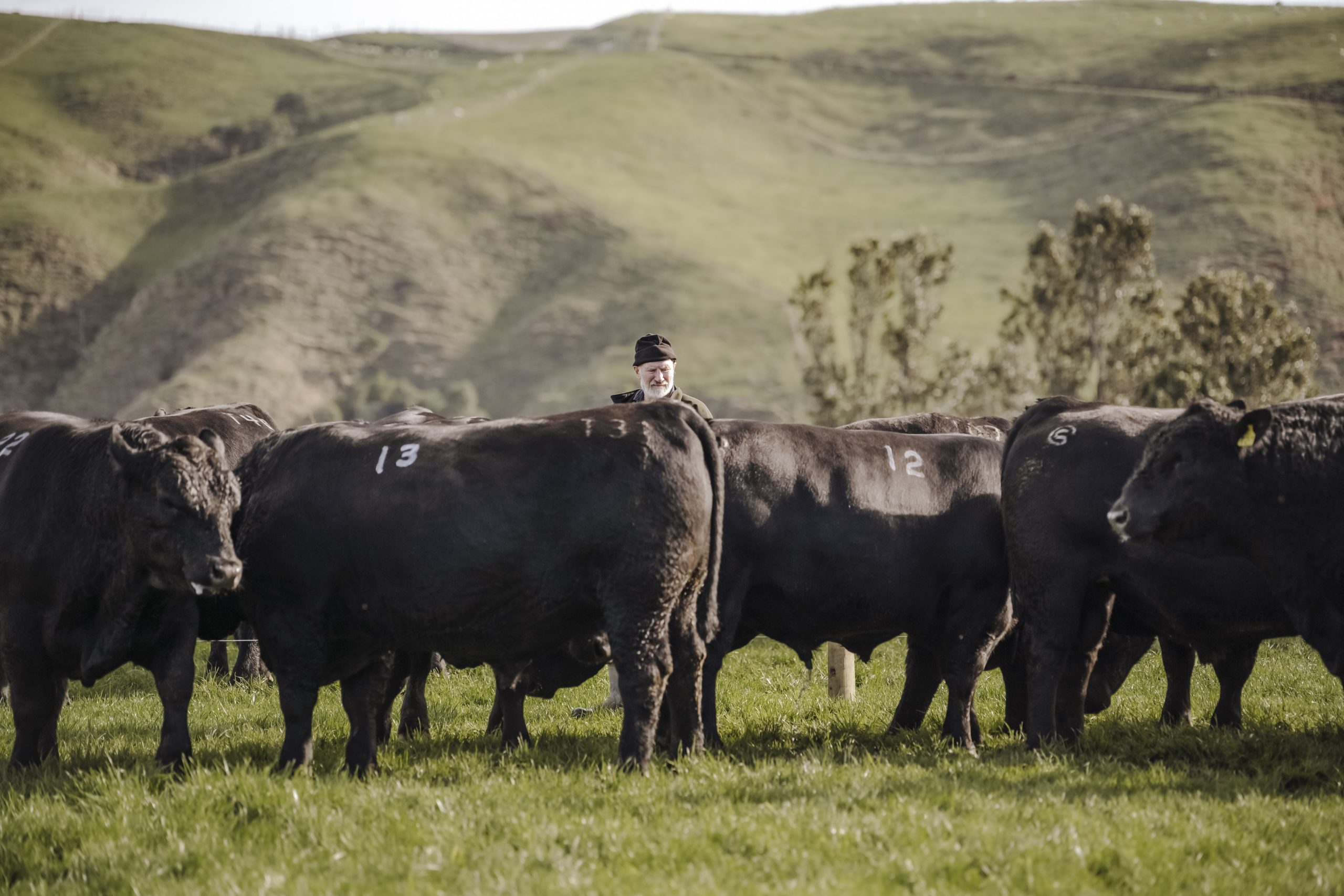For many people, returning home to final demand letters would be a sure sign the honeymoon was over, but for Chris and Lynda Baines, it was the spur to achieve their dream. Mike Bland reports.
In the late 1980s Chris and Lynda Baines returned from their honeymoon to find two final demands amongst their mail. One was from the phone company telling them their phone was about to be disconnected, the other from their electricity supplier saying their power was about to be cut off.
Heavily in debt and struggling to make ends meet, it looked like their farming career was coming to an abrupt halt.
But, like many farmers in a similar position, they cut their costs to the bone and battled on.
Back then they were leasing a 550ha drystock block at Benneydale while trying to save money to buy a farm of their own.
“It was a real struggle,” Chris says.
“The banks wouldn’t lend us money to buy stock but we eventually persuaded a finance company to loan us the money. That loan was secured by the farm owner and cost us 26% interest.”
When they bought their first farm, 235ha at Piopio, the Baines were still considered high-risk clients by the bank.
They reared calves to build equity and stock numbers, and Chris worked off-farm on a range of jobs, including mustering and dagging.
“One year we lost 50 calves to a mystery disease but we didn’t tell the bank because we thought they might sell us up.”
Their interest rate had come down to 18% by then. But with four kids under five years of age, it was still touch and go.
To Lynda, who was raised on a sheep and beef farm in the district and had never had debt until she married Chris, the situation was pretty stressful.
“At one stage we couldn’t even afford Christmas presents for the kids,” she says.
“Chris had to make them using old drench containers and stuff he found at the dump.”
It took them nine years to reach a financially stable position.
Having been through that experience, it would be no surprise if they’d decided to sit tight on the Piopio farm until their debt was paid off. But Chris had much bigger plans in mind – plans that would test the resolve of their bank manager.
In 2000 he and Lynda persuaded their bank to fund the purchase of Waikaka Station at Matiere, northwest of Taumarunui, a much larger and much steeper proposition than the Piopio farm. They thought the hill-country unit, then about 620ha effective, was a better option than expansion at Piopio where land was more expensive.
Waikaka had some challenging contour but it had been well farmed and had good infrastructure. A storm in 1998 had left much of the steeper hill country erosion-scarred. This may have deterred other potential purchasers.
“To a lot of people it would have looked like a hard farm, but to us it looked ideal, and we were lucky that the previous owner left money in.”
For Chris the purchase of Waikaka was the realisation of a long-held vision. Raised on a market garden at Kaiapoi, he’d wanted to be a farmer since he was 10 and started by rearing calves on any spare land his parents had.
After leaving school he worked on a mixed cropping farm near Christchurch before going shepherding in the South Island high country.
When they took over Waikaka, the Baines, with their four young children in tow, were itching to develop the farm further.
“We’ve always funded development out of income and when we first came here we thought we wouldn’t be able to do anything major for five years. But lamb prices lifted and we were able to start straight away.”
Going for scale
Over the past 20 years the Baines have invested heavily in track work and fencing. And in the last six years they have gone back into expansion mode, buying adjoining land to Waikaka. In 2018 they added a 316ha (240ha effective) block, Jolly Farms, which is now managed and partially owned by their son, Jared. Last year they also bought a 206ha (effective) block, Tekoa at Otewa, near Otorohanga, which they take over in June.
With its easier contour, Tekoa will be used mainly as a finishing block. It will carry about 1000 terminal-mated ewes, and the progeny from these ewes will be finished along with about 1600 lambs transferred from Waikaka.
Chris says they tried to find finishing land closer to Taumarunui but land prices in the region had rocketed and the Otorohanga block was comparatively better value.
‘The banks wouldn’t lend us money to buy stock but we eventually persuaded a finance company to loan us the money. That loan was secured by the farm owner and cost us 26% interest.’
And in the long term Tekoa may become a permanent base for Chris and Lynda. It’s more central than Waikaka, which is a 45-minute drive from Taumarunui.
“Two years ago when Lynda suggested we make a move closer to town, I felt like someone had died. We really love it here but I do realise now that we will need to wind down at some stage.”
After buying Tekoa the Baines told their bank manager they wouldn’t be knocking on her door for at least four years. They aim to consolidate and reduce debt, though they haven’t ruled out leasing extra land in the short term and perhaps buying more land in the longer term.
An advantage of the increased scale is that it has enabled the Baines to employ staff. Before, Chris and Lynda ran the farm largely by themselves and this brought its own pressures.
“I love Lynda dearly, but after docking lambs together for two weeks solid, we had completely run of conversation,” jokes Chris.
Things got tougher when the children started school. He often had to work alone when Lynda was called away from the farm for various school commitments.
Now he works alongside his son Jared and shepherd general Jack Casey, who has been on the farm for more than five years. The Baines also employ a labour unit over the summer months and this year it’s Daniel Thompson, who is training to be a shepherd. Lynda still helps out when needed, providing the equivalent of about half a labour unit.
“She gets the tough mustering jobs because she’s got the best team of dogs on the farm,” says Chris.
“She’s also teaching Daniel how to train a dog.”
Chris says having a good team on board has made a massive difference to how the farm is run.
“Everything happens quickly and efficiently. I rarely have to pick up a drench gun these days and I find the dynamics of managing staff stimulating and rewarding. It’s like a dream coming true.”
In 2018 a hip injury suffered while dodging a charging heifer in the yards saw Chris out of action for several months, so he and Lynda were thankful they had good staff.
“For someone who has always been fit and strong, that really knocked him,” says Lynda.
Chris says he found having to rely heavily on others to carry the workload quite humbling, but recovery also gave him time to reflect.
“It’s probably the first time my body has had a rest in 59 years and I felt great afterwards.”
He has always been competitive and continually trying to crutch faster than everybody else. “Now I’m trying to pace myself more.”
While the farm still carries a significant amount of debt, Chris says it’s easily manageable, especially at current interest rates.
“We are very confident with where we are now, and we’ve built a good relationship with our bank.”
Sheep suit the hills
Waikaka Station now totals 2102ha, but a significant proportion of the farm is in bush, which brings the effective area down to 1100ha.
About 60% of grazeable land is steep hill country, with 20% medium hill and the rest flat to rolling.
Stock numbers have varied in recent years, due to drought and the extra land acquired since 2014.
Last year Waikaka carried more than 5000 ewes and 1550 ewe hoggets along with about 290 Angus cows and heifers, and 200 red hinds. This year 1000 ewes will be transferred to Tekoa for winter, and extra replacements will be retained to bring Waikaka’s ewe flock up to about 4500.
“It’s good to be able to supply our own ewes to Tekoa,” says Lynda.
“When we’ve bought a block and stocked it with bought-in sheep, they have never done as well as our own stock.”
The original flock was Romney but the Baines switched to Coopworths about eight years ago, sourcing FE tolerant sires from the Nikau Coopworth Stud in northern Waikato.
Chris says Coopworths have proved their worth on the steep hill country.
“They are very forgiving. They’ve had it pretty tough, especially over the last two drought years, but they still perform.”
Up until two years ago the mixed-age ewes were lambing at 150% (survival to docking), though this fell to 138% in the drought seasons.
About 80% of non-replacement lambs are finished at 16 to 17kg carcaseweight (CW), with the remainder sold store.
“Depending on the season, it can be a battle to finish so many and it’s the ewes that take the pinch,” says Chris.
He says store lamb prices vary considerably from year to year, so the Tekoa block will enable them to finish more lambs and reduce their dependence on the store market.
On Waikaka the Baines keep a small flock of recorded ewes to supply maternal ram lambs for mating. Jared Baines also keeps a flock of 150 recorded ewes on Jolly Farms to provide terminal rams. He mates Southdown-Charollais ewes to Texel rams. Replacement ewes are then crossed back to a Southdown.
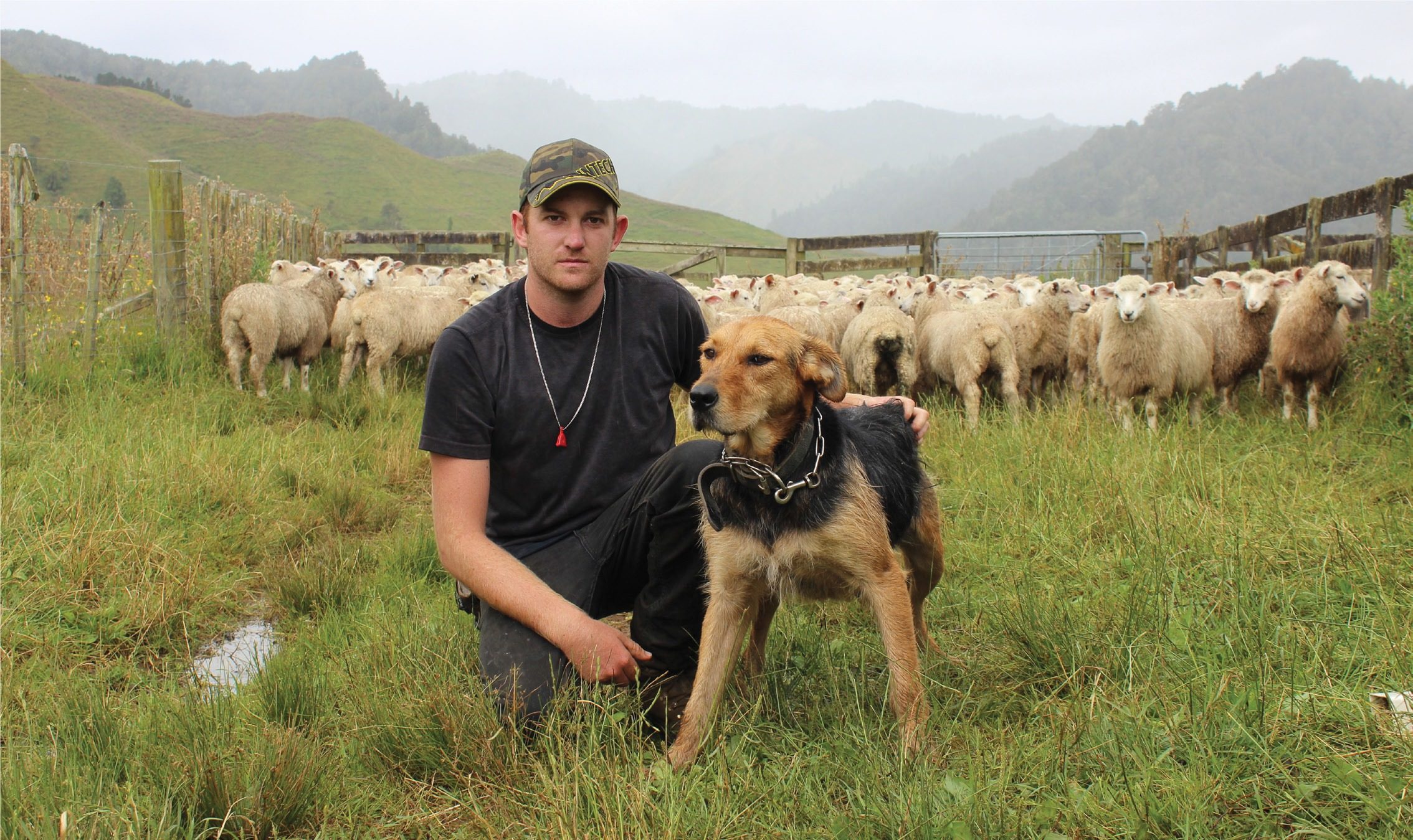
Chris says having a good supply of their own ram lambs means they can afford to pay top dollar for the best outside bloodlines when needed.
Nikau rams are bred for parasite resistance, so he hopes this will help reduce the workload on Waikaka in future.
“I’d like to think that in 10 years we will only be drenching about 20% of our stock.”
Waikaka will winter about 9200 stock units this year. This is below the farm’s potential carrying capacity but the Baines want to take the pressure off the ewes after two hard years.
While the farm received reasonable rainfall during January and was looking in good shape, Chris says the lower stocking rate will give it a breather and allow ewes to add weight for mating and lambing.
Deer make up a relatively small part of the operation but provide diversification. The Baines lease Wapiti stags for mating to their red hinds, and most of their progeny are sold to a King Country finisher at 62 to 64kg liveweight (LW).
Chris says deer are farmed on the steeper country.
“There’s not a lot of work involved with them, and we enjoy mixing with people from the deer farming industry.”
Chris often uses a drone to muster the deer and sheep.
Use debt as a tool
Chris is unreservedly optimistic about the future of sheep and beef farming and he believes farm ownership is still an attainable goal for young people – as long as they are prepared to work and save hard.
Chris and Lynda tried to instil the importance of saving and investing wisely into their offspring – Jared, Corey, Melody and Stormey – from an early age.
The children had to learn the difference between an asset and a liability.
“Each of them reared five calves and they had to break-feed them on the side of the road to help them understand that feed comes at a cost. Then we gave them the opportunity to lease a paddock at commercial rates.”
All four did well out of their ventures, using the proceeds to buy their first car. They were then encouraged to use their savings to buy an investment property.
“They had varying degrees of success with their rental properties but they gained a lot of life experience.”
Jared, the oldest son, sold his rental in Taumarunui to buy shares in a company the Baines set up to own Jolly Farms. He eventually hopes to buy the whole farm (see breakout).
Chris says a degree of risk is the cost of any land purchase.
“I’ve never been afraid of risk, even if it means borrowing more money than the bank’s comfortable with.”
Despite sailing close to the wind at times, he says the whole farming experience has been a worthwhile journey.
“Our first focus was to buy a farm and that seemed impossible. After we’d achieved that we wanted to buy a bigger farm and that seemed impossible too.
“If at some point we had lost the farm, at least we could say we enjoyed farming while we had it.”
FARM FACTS
- Waikaka Station
- Matiere, northwest of Taumarunui
- 2012ha total (1100ha effective)
- Rolling, medium hill and steep hill country
- Running sheep, breeding cows, deer and goats
- Up to 80% of lambs finished, depending on season
- Two more blocks (totalling 446ha effective) added since 2018 to build scale.
Feral goats utilised
Waikaka is also home to a flock of 1000 to 1200 feral goats, which were originally used as a development tool on the station. The Baines still use the goats to control weeds like blackberry, ragwort and Manuka, and sell about 600 to 700 a year into the goat meat market.
Lynda says many of the feral goats come from the bush that surrounds the farm.
“We have experimented a bit with different breeds but the feral has always been the best.”
The Baines do a minimum of 4km of fencing a year. Most of it is new subdivision but Chris says they still have unfenced bush boundaries they’d like to fence.
Wild pigs can be a problem as they come out of the bush and disturb lambing ewes, causing mis-mothering.
Fortunately, shepherd Jack is a keen pig hunter and he does his best to keep numbers down.

